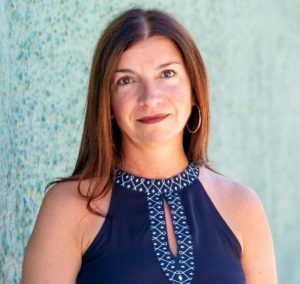 This August, WHI Communications Committee Co-Chair Liz Conlin met with Trish Cortes, executive director of the Washtenaw County Community Mental Health (WCCMH) agency, to discuss the significance of mental health funding, new challenges with our behavioral health workforce, plus the impact of local community partnerships and how the WHI has supported the work.
This August, WHI Communications Committee Co-Chair Liz Conlin met with Trish Cortes, executive director of the Washtenaw County Community Mental Health (WCCMH) agency, to discuss the significance of mental health funding, new challenges with our behavioral health workforce, plus the impact of local community partnerships and how the WHI has supported the work.
Q. What originally got you involved in mental health?
Cortes. That’s an easy answer for me. After I graduated from nursing school at the University of Michigan, I moved to Boulder, Colorado. While I was taking my license exam, my first job was working as a certified nursing assistant—providing direct care work with individuals with intellectual and developmental disabilities.
Then, I became a nurse at the home care agency, continuing to work with that population, before moving to Boulder County’s community mental health organization. I fell in love with the population doing care. So that’s how I got into—and stayed in—the mental health care field.
Q. What challenges or gaps are you dealing with in Washtenaw County?
Cortes. A big challenge is the unprecedented workforce shortage across the state and system. It’s everything—direct care staff, social workers, nurses, even administrative staff. Name the discipline, we’re seeing recruiting challenges. And we’re competing with larger, more lucrative systems that are also seeing those challenges. It’s nothing like I’ve ever seen.
Historically, we’ve always dealt with the underfunding of mental health services. This has been very challenging and problematic for most of my 20-year career to this point. Funding from the COVID-19 pandemic and our local millage has helped, but it’s not structural or guaranteed long-term. The future of robust funding for mental health services is still very uncertain.
Q. What are some of your proudest professional accomplishments?
Cortes. I think a super proud moment is the passage of the Public Safety and Mental Health Preservation Millage. And being able to pass it with a two-to-one vote in favor—the level of confidence that voters in Washtenaw County had and how much they care about public safety and mental health.
What we’ve been able to implement and do with those dollars has been just a real source of pride. Serving people agnostic of their insurance, getting people help who previously had a lot of challenges accessing services—let alone the partnerships with the schools, the Sheriff’s Office.
The list of things we’re doing, and will be able to do in the future, is a real source of pride.
Q. Why did you join the Washtenaw Health Initiative and how has it been helpful?
Cortes. The executive director of WCCMH is one of the “must have” seats at the steering committee table. That being said, I find it to be very helpful to talk things out with other perspectives and views around that table.
Though the original intent was around the implementation of the Affordable Care Act, I think all of us are still at the table now because it’s brought a lot of health care leaders and partners together who are working toward a common cause. It’s evolved a little over time—and it’s been very helpful in us having a better understanding of what the right and left hand are doing.
I also think the WHI has been great at getting factual information out about complicated, important topics and issues that have a tremendous impact on the health care system, including the mental health care system.
Q. What inspires you to continue working for improved mental health in our community?
Cortes. Number one—I find my staff to be a huge inspiration. Seeing the great work they do and the partnerships that we have, it’s unbelievable. Especially what staff did for our clients throughout COVID, it just shows how mission-driven they are. I’m incredibly humbled by their compassion and their passion for the work.
The other thing is an attribute of Washtenaw County. The number of partnerships we have, including people who aren’t necessarily anywhere near health care systems, like law enforcement, housing providers, schools. Seeing these people come to the table to better our local mental health services—it’s really inspiring to me to see how important this work is to everyone.
I really think it takes a village. And I’m fortunate to feel like I’m living in the right village to get this work done.
